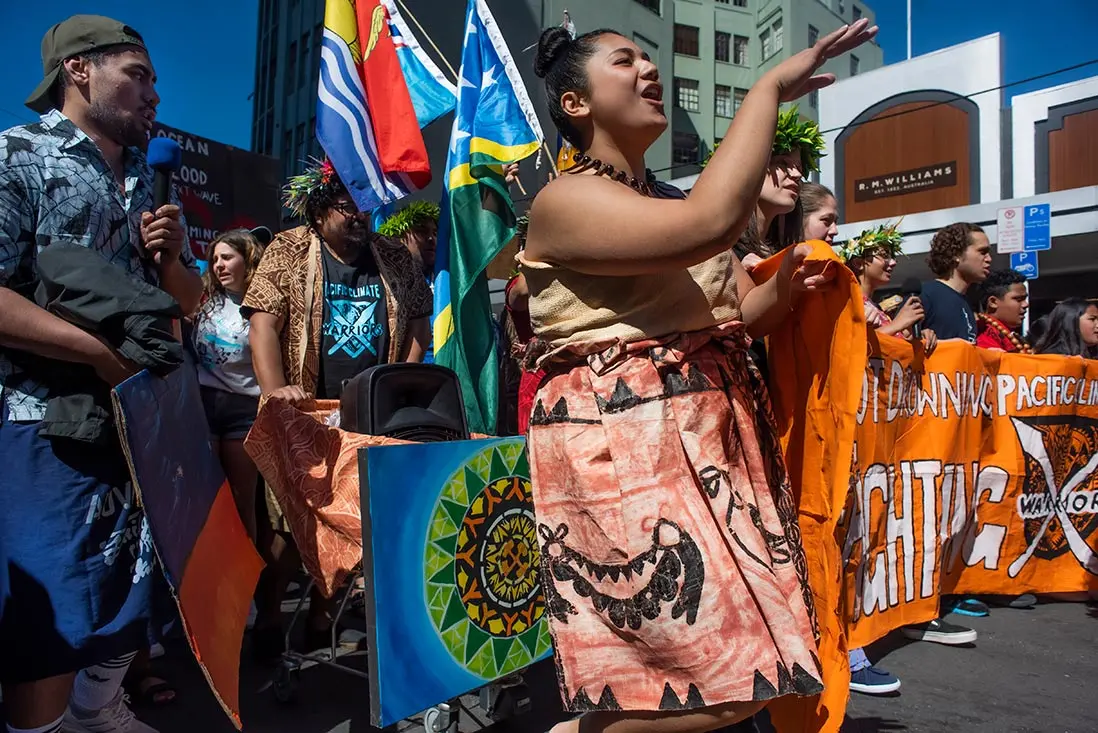Image credit: Pacific Climate Warriors lead the way during the School Strike 4 Climate protest in Wellington, September 2019 by Dylan Owen. All rights reserved. Used with permission.

Image credit: Pacific Climate Warriors lead the way during the School Strike 4 Climate protest in Wellington, September 2019 by Dylan Owen. All rights reserved. Used with permission.

Our recent large protests have focused on climate change and involved many rangatahi and student-led organisations like School Strike 4 Climate and Pacific Climate Warriors. Find out more, and explore our collections and curated resources.
Aotearoa New Zealand has a rich history of activism and protest, focusing on causes ranging from women’s suffrage and Māori land rights to nuclear weapons, racism and marriage equality. In 2019, the viability of the planet itself became a focus as several large-scale climate strikes urged action on climate change. Uniquely, these protests were organised mainly by school students on behalf of the rangatahi, the coming generation, which would be most affected by the consequences of inaction. The September climate strike, the third of the year, was coordinated and co-hosted by School Strike 4 Climate and 350 Pacific, aka Pacific Climate Warriors.
The groups’ collaboration aimed to highlight how climate change affects the Pacific Islands, and New Zealand’s responsibility as a Pacific country to take urgent action on the issue. Their protest illustrated the hope of our rangatahi for their future and their courage to face it, a resilience summed up by the Pacific Climate Warriors’ motto: ‘We are not drowning! We are fighting!’
Protesters marched from Wellington’s Civic Square to the steps of Parliament, chanting demands and singing songs and hymns from the Pacific. At Parliament, children, students and activists made speeches, and the Pacific Climate Warriors performed a fatele, a Tokelauan action song.
The protest was part of an international series that took place across 150 countries during Global Week for Future. Some 40,000 people attended the Wellington march, part of an estimated 170,000 protesters in cities and towns throughout the country and some 6 million throughout the world.
The demand for climate action for New Zealand and its Pacific neighbours was reinforced on the morning of the strike by a letter presented to Parliament that called on the government to declare a climate emergency. A little over a year after the protests, the newly re-elected Labour government did just that.
Images such as this help embroider protest in the tapestry of New Zealand’s history, a reminder of issues that are important to our people and the struggle to get action taken on them. The image is part of a collection being made by photographer Dylan Owen to document public events in Wellington, often just a stone’s throw from his workplace in the National Library.
Story written by: Ulu Afaese
Copyright: Turnbull Endowment Trust
Critical to the impact of this large-scale protest were the efforts of the organisers. It was co-ordinated and co-hosted by School Strike 4 Climate, led by Sophie Handford and Raven Maeder, and 350 Pacific (also known as Pacific Climate Warriors), led by Mary Moeono-Kolio and Kalo Afeaki.
Explore the Alexander Turnbull Library collections further: Climate protest.
Topic Explorer has:
Many Answers has Climate change.
Want to share, print or reuse one of our images? Read the guidelines for reusing Alexander Turnbull Library images.
Tikanga ā-iwi:
Te whakaritenga pāpori me te ahurea
Te ao hurihuri
Te wāhi me te taiao
Ngā mahinga ohaoha.
Te Takanga o Te Wā (ngā hītori o Aotearoa):
Kaitiakitanga
Tūrangawaewae.
Social sciences concepts:
Identity, culture, and organisation
Continuity and change.
Aotearoa New Zealand’s histories:
The exercise of power
Relationships and connections between people.